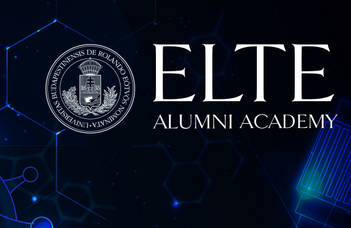Chapter event - ELTE Alumni Academy: What’s new in science lecture series

The first series of events the popular-scientific lecture series titled “What’s new in science” started in April 2021. In this series, the International Alumni Chapter organizes lectures held by ELTE professors, specifically for international alumni members of the University and anyone interested. The topics for the lectures all revolve around science. This academic year, the lectures detailed the effects of the pandemic situation on education. The lectures were made possible with support from the ELTE Alumni Centre.

On 28 April, Dr. Viktor Müller, biologist held the opening lecture of the series. Viktor Müller is an Associate Professor (Habil.) at the Institute of Biology and the Department of Plant Systematics, Ecology and Theoretical Biology at the Faculty of Science, ELTE, currently also Vice Dean of the Faculty of Science at ELTE. He received his Ph.D. at ELTE in 2002. He studies the dynamics and evolution of infectious diseases, using mathematical and simulation modeling, data analysis and evolutionary theory. He is a computational and theoretical biologist.
Dr. Viktor Müller discussed the following topic during his lecture: “COVID-19 through the lens of evolution”. Evolution permeates all life, but its action is often hidden from the human observer. Not so with the breakneck speed of evolution that we are currently witnessing in the adaptation of the SARS-CoV-2 coronavirus to its new host species—us. In this talk, the professor gave a general introduction to the evolutionary principles that shape infectious diseases, with an emphasis on virulence—that is, the harm they are causing us. He then provided an overview of what we have learned so far about the evolution of the novel coronavirus, how it affects the course of the disease and of the pandemic, and what we can expect in the future.
Dr. Viktor Müller’s presentation

The second lecture on 26 May was held by Domonkos Sik, Associate Professor at the Department of Social Theory, Faculty of Social Sciences, ELTE. His research deals with various topics in critical theory including phenomenology of mental disorders and late modernity. His work has appeared in such venues as The Sociological Review and European Journal of Social Theory. He has written several monographs including Radicalism and indifference (2016) and A szenvedés határállapotai {Lasting suffering} (2018).
The topic of the lecture was the following: “Solidarity in times of a pandemic – the results of an online survey in Hungary”. From a sociological perspective, situations like the pandemic provide a unique opportunity for analyzing otherwise tacit patterns of solidarity. The lecture provided a comprehensive analysis, involving supportive interactions; competition for recognition; discursive frames of deservingness and respectability. These dimensions are mapped in parallel: types of problems and needs; sources of received support; the problematic aspects of support; types of support provided to family members and friends; types of support provided to generalized others constitute the dimensions of a survey-based analysis describing the ideal-typical patterns of solidarity. These patterns were analyzed from the perspective of their social background and related attitudes.
A detailed summary of Dr. Domonkos Sik’s lecture can be read here.
Dr. Domonkos Sik’s presentation

The third lecture of the popular-scientific lecture series “What’s new in science” was held on 23 June 2021 by Dr. Róbert Urbán, Head of the Department of Personality and Health Psychology, Faculty of Education and Psychology, ELTE. Róbert Urbán is a health psychologist, and his main research interest is focused on the behavioral determinants of health such as smoking, physical activity and eating behaviors.
In his lecture, he discussed the following topic: “Health psychology of COVID-19: when behavioural sciences and virology meet”. Dealing with the pandemic of COVID-19 and its long-term consequences requires the collaboration of researchers and practitioners from different scientific fields, from virology to behavioral science. In addition, health psychologists can play a crucial role, for example, in the prevention of viral transmission, the increasing uptake of vaccination, the promotion of screening for viral infection, the recognition of the challenges of public health interventions, the understanding the psychological impact of severe conditions related to COVID-19, and the long-term rehabilitation of people suffering from post COVID conditions.
In his lecture, Dr. Róbert Urbán reviewed several aspects of COVID-19 from the perspective of health psychology. Health psychology emphasizes that besides the incredible development of molecular biology and biotechnology, individual human behaviors and collective actions remain the cornerstones in all preventive efforts dealing with the current and future challenges of health. Also, we should investigate human behavior and experience related to COVID-19 from both biopsychosocial and social-ecological perspectives. The biopsychosocial model, for example, emphasizes the interactions of different body systems described in the concept of 'sickness behaviors' in understanding the mental health symptoms during viral infections. The social-ecological perspective stresses the importance of social context in coping with the demands of prevention and treatment of COVID-19 conditions. Finally, we need to use existing knowledge and plan further investigations to develop psychosocial interventions for strengthening population health and preventing negative long-term consequences of COVID-19 and other future epidemics.
The pandemic of COVID-19 made it necessary to recognize the importance of behavioral sciences in preventing and dealing with future pandemics or other global challenges.
Dr. Róbert Urbán’s presentation
The lecture series will resume after the summer break. In autumn, we are launching two more series within the framework of ELTE Alumni Academy.
